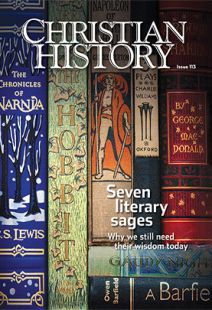What C. S. Lewis learned from his “master”
Lewis’s writing is often recommended to those seeking to better understand Christianity. But his recommendation to seekers was to read George MacDonald: “My own debt to [Unspoken Sermons] is almost as great as one man can owe to another: and nearly all serious inquirers to whom I have introduced it acknowledge that it has given them great help—sometimes indispensable help toward the very acceptance of the Christian faith.”
MacDonald not only discipled Lewis as a Christian, but also as an author and literary scholar. If, like Lewis, you delight in what he calls “source-hunting,” then tracing Lewis’s literary roots in MacDonald may prove boundless. You will discover the source of the title of Till We Have Faces, of Lewis’s vision of “Shadowlands,” of his designation unman for the diabolical villain in Perelandra. You will find characters who step into pictures, pass between worlds, and discuss the options of liar, fool, or truth-teller. You will meet a “child of Adam,” know heaven as a “high country,” and be reminded that God is not tame. You will read of a dwarf who thinks himself a man, trace reconfigurations of the Psyche myth, and detect familiar approaches to Dante, Milton, and Spenser. You will identify intimations of Jadis in her ancestress Lilith, recognize parallels to Ransom in the “Curdie books” he gives to Jane, and realize that the character of “George MacDonald” in The Great Divorce is only one of many homages Lewis pays to his “master.”
If archives entice, visit Wheaton College’s Wade Center to peruse Lewis’s personal editions of MacDonald. In the essay “Imagination,” for instance, he responded with a sentence at the top of every page. But don’t just scan the notes, do Lewis the honor of reading MacDonald yourself. You too may find great, perhaps indispensable, help.
By Kirstin Jeffrey Johnson
[Christian History originally published this article in Christian History Issue #113 in 2015]
Kirstin Jeffrey JohnsonNext articles
Learning what no one meant to teach
The educational experiences of C. S. Lewis (1898-1963)
Michael WardDid you know?
MacDonald’s players, Tolkien’s grave, Chesterton’s pajamas, and Lewis’s hat
the editorsEditor's note: Seven literary sages
How much did C.S. Lewis and his friends and mentors change the society around them?
Jennifer Woodruff TaitBread of the earth and bread of heaven
G. K. Chesterton (1874-1936) wanted a new kind of Christian economics
Ralph C. Wood



